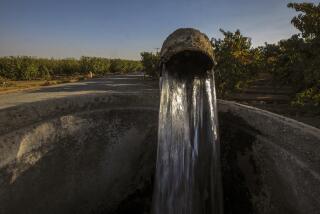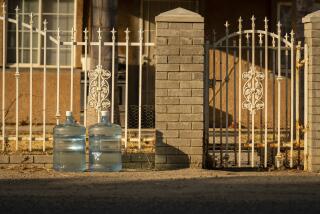Editorial: Hundreds of thousands of Californians lack access to safe drinking water. Let’s fix that once and for all
- Share via
California’s wet winter eased the immediate water shortages that affected most of the state, giving lawmakers and water agencies a bit of a breather as they craft new policies and design new infrastructure to weather the next big drought (which, for all we know, may already be underway).
But neither the rainfall nor the new projects and policies will help hundreds of thousands of Californians whose local water supply is contaminated. These residents must either pay an inordinate amount of their income to truck in drinkable water or suffer the dire health consequences of drinking, cooking with and bathing in poisonous H20.
At issue are shortages of wealth as well as clean water. Poverty traps people in many parts of the state where water quality has always been substandard, or where it has been made toxic by agricultural or urban runoff or drought that concentrates naturally occurring contaminants. Californians with money could move away or fund agencies that would build treatment plants or connect to distant sources of healthful water, but too many people don’t have those options.
Negotiations have slogged on for years about how to deal with this problem. Growers and dairy farmers have long acknowledged at least some responsibility for the nitrate contaminants that come from fertilizers and livestock but have dickered over how to apportion blame (and with it, the cost of remediation). Individual water boards around the state can proceed against presumed polluters one by one, but they each do so with their own sense of urgency, or lack thereof. Lawyers can file suit against the state’s 80,000 or so farmers, one by one, but that does little to relieve the ongoing desperation of Californians with access to neither clean water nor sufficient money to do anything about it.
There are perhaps as many as a million Californians who don’t have [safe, affordable drinking water] and can’t afford it.
Contrary to expectations, those negotiations have produced a bill that would provide a pragmatic and timely solution to the problem. It is backed by an unusual combination of both agricultural interests and environmental justice advocates. It would establish a $100-million fund to finance projects that supply clean, safe and affordable water to people currently without it. Growers would pay a fee on fertilizer or some other assessment for a 15-year period. Water ratepayers across the state would fund most of the rest through a fee of up to $1 per month.
Should water customers in Los Angeles and other parts of the state who already pay to maintain high quality and sufficient supplies for their own use — and who likely will be paying even more for recycling and other projects — also pay a bit more to secure safe and clean water for others?
Yes.
The drought was a reminder of the degree to which Californians are interdependent, especially when it comes to water. Northern Californians have been known to complain that the water from melting Sierra snowfall and the resulting rivers and streams is theirs, and that L.A. and neighboring cities are stealing it from them. In reality, California water falls and flows in an intricate web throughout the state, from the Colorado to the Klamath to the Sacramento and the San Joaquin. Winter storms in any part of the state become our collective good fortune, and likewise drought and shortages in any part of the state stress the supply for all of us. Ratepayers pay not just for water that is locally produced, cleaned, stored and distributed, but for connections to a larger statewide system that bonds us to one another and mutually secures our supplies.
As the crippling drought began, California become the only state in the nation to adopt by law the high-minded principle that access to safe and affordable drinking water is a human right and, by implication, should be guaranteed for everyone in the state. But there are perhaps as many as a million Californians who don’t have it and can’t afford it. This bill — SB 623 by Sen. Bill Monning, D-Santa Cruz — can hook them up. Lawmakers should say “yes.”
As is so often the case with California water, it is possible to keep wrangling for years over who is taking what from whom, and difficult to craft a workable solution that provides immediate relief. This is one such solution, and lawmakers should not allow it to evaporate.
Follow the Opinion section on Twitter @latimesopinion and Facebook
More to Read
A cure for the common opinion
Get thought-provoking perspectives with our weekly newsletter.
You may occasionally receive promotional content from the Los Angeles Times.










